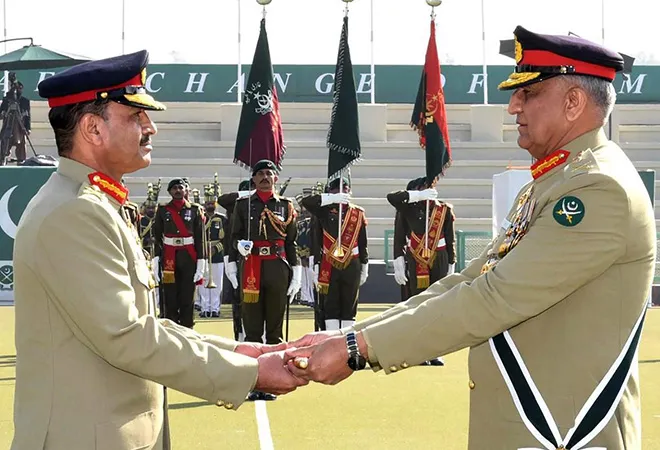Lieutenant General Syed Asim Munir has
taken over as Pakistan’s new Chief of Army Staff (COAS) from
General Qamar Javed Bajwa, who retired on November 29 after a six-year-long tenure. Gen. Munir will inherit a lot of political and economic mess from his predecessor. Therefore, his foremost task will be to restore the sullied image of the Pakistan Army, resolve internal differences, and generate confidence in the country’s political establishment by displaying neutrality. As a part of this, he may devise hawkish policies on national security matters in the near term.
Gen. Munir is the 17th Army Chief of Pakistan. A graduate of the 17th batch of the Officers Training School at Mangla, he was commissioned into the 23rd Battalion of Pakistan Army’s Frontier Force Regiment. His experience ranges from leading Force Command Northern Areas in Gilgit-Baltistan to heading both the Military Intelligence and Pakistan’s Inter-Services Intelligence (ISI). Notably, he was the ISI chief during the Pulwama suicide attack in Kashmir in February 2019. It is expected that he will follow a hard-line policy
vis-à-vis India.
Fixing civil-military relations
Under Gen. Bajwa’s leadership, the military establishment brazenly interfered in political ‘engineering’ by first installing the Imran Khan-led Pakistan Tehreek-i-Insaf’s (PTI) ‘hybrid’ regime in 2018, and then allegedly removing him from power in April this year. However, it only ensued persisting political instability in Pakistan. Since his ousting, Imran Khan and the PTI have been on the offensive, launching a campaign against the ‘imported’ coalition government of the Shehbaz Sharif-led Pakistan Democratic Movement and the military establishment. This has caused serious damage to civil-military relations. Mr. Khan has openly accused Gen. Bajwa and other senior Army officers of ‘illegally’ removing the PTI government, attempting to assassinate him, and being involved in the mysterious killing of a pro-PTI journalist Arshad Sharif in Kenya last month. Interestingly, such are the political dynamics of Pakistan that when Mr. Khan was in power, former Prime Minister Nawaz Sharif had blamed Gen. Bajwa for plotting against him, politicising the judiciary and installing a “selected and incompetent” PTI government.
Under Gen. Bajwa’s leadership, the military establishment brazenly interfered in political ‘engineering’ by first installing the Imran Khan-led Pakistan Tehreek-i-Insaf’s (PTI) ‘hybrid’ regime in 2018, and then allegedly removing him from power in April this year.
These developments have raised the Pakistani political class’s long-held fears about the military establishment’s intentions. The political instability has also taken its toll on the Pakistani economy, which is now facing the risk of default. This has caused unprecedented political and public backlash against the Army leadership. So, restoring the Army’s pole position and providing a semblance of order in civil-military relations will likely be Gen. Munir’s top priority as the new COAS. In the long run, he will also prioritise maintaining the military’s supremacy over civilian institutions in Pakistan.
Securing Pakistan
As part of restoring the Army’s image and mobilising public opinion in its favour, he may follow in the footsteps of his predecessors by launching a new military operation in the Tehreek-i-Taliban Pakistan (TTP)-affected tribal areas in the Khyber Pakhtunkhwa province. Gen. Raheel Sharif and Gen. Bajwa had initiated military operations — Zarb-e-Azb (2014) and Radd-ul-Fasaad (2017), respectively, to mark their presence and consolidate power as the new COAS. Already, there are calls for military intervention in the Swat Valley and erstwhile Federally Administered Tribal Areas agencies to control growing militancy and provide security to the local population.
More importantly, Gen. Munir will have to decide the future of the peace dialogue with the TTP, which has stalled after the Pakistani government dilly dallied on accepting the militant group’s demands. The Afghan Taliban regime in Kabul, which has played an active role in mediating between the Pakistan Army and TTP, has achieved little success. This has frustrated Islamabad and Rawalpindi, exacerbating the already strained ties due to the unresolved differences over the Durand Line, separating Pakistan and Afghanistan. In recent months, there have been frequent and violent border clashes between the two neighbours over Pakistan’s fencing of the Line.
Toughening India policy
On India, COAS Munir is unlikely to follow the lead of Gen. Bajwa, who, guided by his security calculations, had been instrumental in agreeing to a ceasefire on the Line of Control (LoC) in February 2021. The ceasefire has largely held. As Gen. Munir has taken charge, the LoC may get active again in the coming months, post-winter. While there are enough pressing domestic matters to keep Gen. Munir preoccupied, he may be keen to signal India that he means business and that New Delhi should not exploit Pakistan’s current predicaments.
The faltering economy will be his greatest challenge, and his priority would be to ensure that the Army is not blamed for economic mismanagement and grave shortages of essential commodities in Pakistan.
India will prefer to wait and watch. Given Gen. Munir’s ISI portfolio at the time of the 2019 Pulwama attack, there is a concern that cross-border terror activities will see a spike, particularly in Jammu and Kashmir. The easing of international pressure on Pakistan in the form of its exit from the Financial Action Task Force’s ‘grey list’ may be an enabler. Gen. Munir may, therefore, utilise his operational and intelligence expertise in formulating a rejigged, possibly hawkish, policy on India.
To sum up, Gen. Munir will carry his predecessor’s baggage for the foreseeable future of his tenure. He will face multiple challenges in bringing political stability and elevating people’s perception of the Army. The faltering economy will be his greatest challenge, and his priority would be to ensure that the Army is not blamed for economic mismanagement and grave shortages of essential commodities in Pakistan. If everything fails, he could use the known diversionary tactics to rally key stakeholders behind the Army as the only ‘saviour of Pakistan’.
This commentary originally appeared in The Hindu.
The views expressed above belong to the author(s). ORF research and analyses now available on Telegram! Click here to access our curated content — blogs, longforms and interviews.

